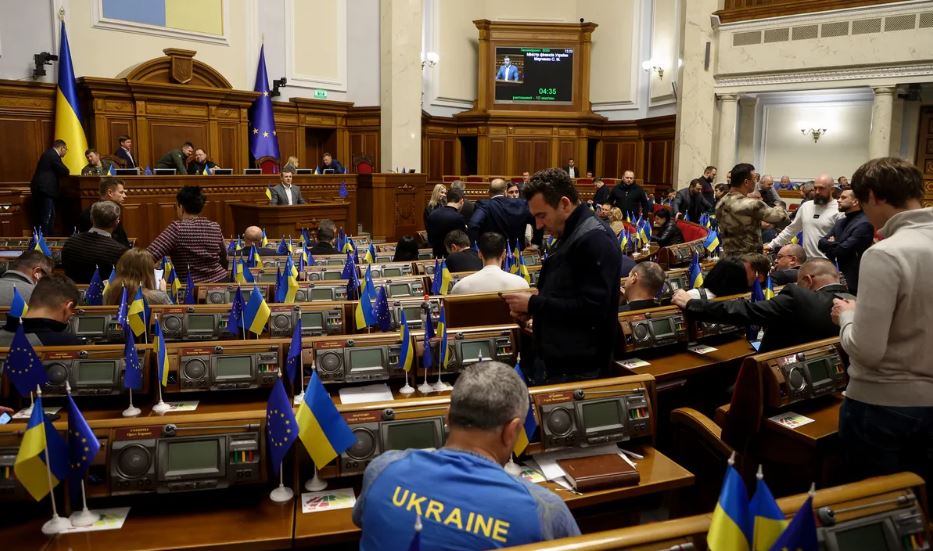Members of Parliament of Ukraine cannot travel abroad and in responce are refusing to show up in parliament to discuss important matters at a time the country is enduring heavy bombardment from Russians.
In recent months, Ukraine’s parliament is drifting to a standstill, as the government struggles to gather necessary votes during sessions. The Verkhovna Rada, Ukraine’s parliament, has a record low 401 members. By law there should be 450.
Yaroslav Zhelezniak, first deputy head of the Committee on Finance, Tax, and Customs Policy and a member of the Holos party said When parliament members feel their ability to travel for work depends on their voting, “they are just like hostages.”
This contributes to demoralization and absenteeism: “It’s better to not show up, than to vote negatively and be punished.”
“There is a feeling that the parliament is effectively on pause and there is a perceived conflict between the president and the parliament,” said Ukrainian political scientist and commentator Mykola Davydiuk.
Iryna Pobedonostseva, a representative for the President’s Office, said in a statement that charges of the office’s interference in lawmakers’ foreign travel “do not correspond to reality,” and noted that parliament’s leadership is responsible for travel approval.
“The position of the Office of the President is very clear – during a full-scale war, all representatives of all branches of government, including legislative, executive and judicial, as well as absolutely all officials in the field of public administration must work at 100%,” the statement said.
Some in Zelensky’s party feel the blame lies outside of the government, however. Mykyta Poturaiev, chair of the Humanitarian and Information Policy Committee, believes negative public opinion against parliament is a bigger driver of a lack of participation for some of his colleagues.
“I understand that in every country people don’t like parliaments,” said Poturaiev. But after voting on historically vital laws for national security, defense, and European integration, “you don’t feel support from the media, you don’t feel support from the population.”
“How should they feel when they read about themselves, that they are all bastards, corrupt bastards?”
In December, a poll by the Kyiv International Institute of Sociology found that only 15% of Ukrainians trusted parliament, down from 35% the prior year and the lowest among government bodies in the poll.
Additionally, what it means to be a parliamentarian has changed since the elections in 2019. Parliamentary immunity, which required approval by parliament before arresting or charging lawmakers, was abolished later that year.
And efforts to bring Ukraine up to European standards have led to increased financial monitoring and reporting requirements on lawmakers and their families.
“If earlier politicians were sure that they had certain protection against law enforcement and anti-corruption bodies, now there is no such thing,” said Salizhenko, of Chesno.
This heightened scrutiny has contributed to the fall in parliament’s reputation, as several MPs have been implicated in corruption cases since the last election, including being caught attempting to solicit or take bribes.
However, parliament is not the only government body to be hit by recent corruption scandals, with high-profile cases also hitting the Defense Ministry, President’s Office, and the Cabinet.

The Verkhovna Rada, Ukraine’s parliament
Many members of parliament have requested to resign from their positions. Lawmakers can be blocked from resigning, they can’t be forced to vote.
Despite the drop in number of the total lawmakers, experts note that Zelensky’s ruling party still holds a supermajority of 235 seats, while only 226 are needed to pass most legislation.
“The formal number of parliament members is not as important as how much they are actually present in the session hall,” said Oleksandr Salizhenko, a parliamentary analyst.
Members of parliament have reported cases where they were refused permission even for official business abroad.
“Why would one want to limit the possibility to communicate with allies,” said Natalukha, the Economic Committee chair. Parliamentary diplomacy has been effective in swaying allies to provide support, and limiting travel is “damaging for our country’s war effort.”
Several lawmakers from opposition parties feel increasingly powerless in the face of the influential President’s Office.
“There is a feeling that the parliament is effectively on pause and there is a perceived conflict between the president and the parliament,” said Ukrainian political scientist and commentator Mykola Davydiuk.



















